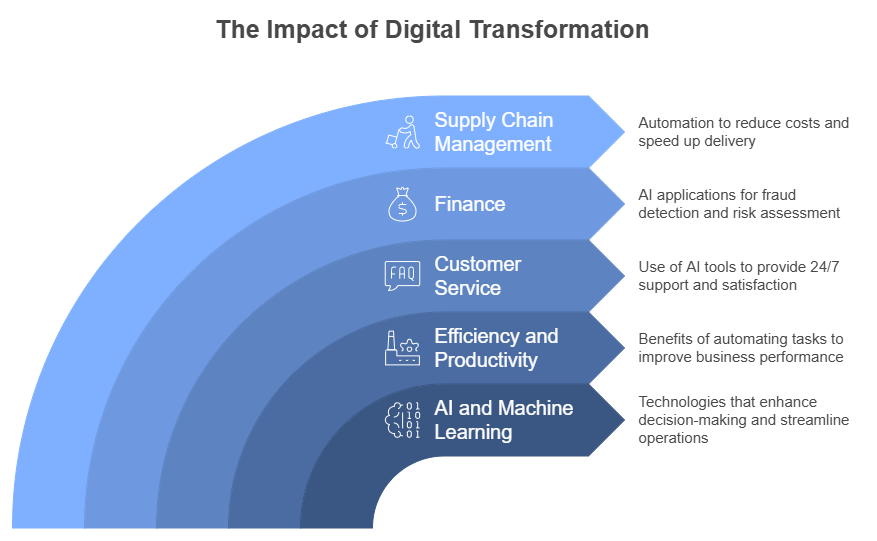 Understanding current business trends can give your company a competitive edge and help you make strategic decisions. Trends like digital transformation, remote work, and sustainability reflect changes in both the workplace and customer expectations. Adopting these practices not only meets market demands but also helps build a resilient and adaptable business.
Understanding current business trends can give your company a competitive edge and help you make strategic decisions. Trends like digital transformation, remote work, and sustainability reflect changes in both the workplace and customer expectations. Adopting these practices not only meets market demands but also helps build a resilient and adaptable business.
As you explore these trends, you’ll find opportunities to improve efficiency, attract talent, and enhance customer experiences. Many trends focus on creating value for employees and customers alike, which strengthens your brand’s reputation. Staying informed about these changes allows you to align your business with modern standards, preparing for both challenges and growth.
By considering these trends thoughtfully, you can shape a forward-looking approach that benefits your company in the long term.
Remote and Hybrid Work Models
Flexible work environments, including remote and hybrid models, have become significant in current business trends. Many companies now offer remote work options, allowing employees to work from home part-time or full-time. These models provide flexibility, which has been shown to increase job satisfaction and reduce turnover. When employees have control over where they work, they often feel more engaged and motivated, which can lead to higher productivity.
Hybrid models, where employees split time between home and the office, offer a balanced approach. This setup allows workers to benefit from both the flexibility of remote work and the collaboration opportunities of in-person meetings. Additionally, hybrid and remote models can help companies reduce operational costs by lowering the need for office space, utilities, and other overhead expenses. These cost savings allow businesses to invest more in employee support or growth initiatives, benefiting the organization overall.
While flexible work models have clear advantages, they also require effective communication and management strategies. Many businesses have adopted digital collaboration tools to support team interaction and maintain productivity. As remote and hybrid work continue to shape current business trends, companies that prioritize flexibility and communication may see stronger employee performance and satisfaction. These work models not only respond to employees’ needs but also support business adaptability in a changing workplace environment.
Sustainability and Eco-Friendly Practices
Sustainability and eco-friendly practices have become essential in current business trends as consumers increasingly demand responsible, environmentally conscious brands. Many businesses are adopting sustainable practices, such as reducing waste, sourcing materials responsibly, and minimizing energy consumption. This shift not only meets consumer expectations but also positions companies as leaders in environmental responsibility, which can strengthen customer loyalty.
Green technologies are playing a central role in this shift toward sustainability. Renewable energy sources, eco-friendly packaging, and efficient manufacturing processes are helping companies reduce their carbon footprint. These technologies often result in long-term savings by lowering energy costs and waste. Many companies also find that sustainability initiatives attract customers who prioritize eco-friendly practices in their purchasing decisions.
As demand for eco-conscious brands grows, businesses that adopt sustainable practices can benefit from a competitive edge. By implementing green technologies and sustainable policies, you can align with consumer values and contribute to a healthier planet. Adopting eco-friendly practices demonstrates commitment to both innovation and environmental responsibility, which is increasingly valued in the marketplace. Sustainability is more than a trend; it’s a meaningful way to support future growth and customer satisfaction.
Digital Transformation and Automation
Digital transformation and automation have become central to current business trends, driving change across nearly every industry. Many companies are investing in digital solutions like artificial intelligence and machine learning to streamline operations and improve decision-making. These technologies allow businesses to automate repetitive tasks, reducing the need for manual work and increasing efficiency. By embracing automation, businesses can allocate resources to more strategic areas, helping to foster growth and innovation.
The use of AI-powered tools is particularly significant in customer service, finance, and supply chain management. For example, chatbots and automated customer support systems allow businesses to respond to inquiries around the clock. In finance, AI helps with fraud detection and risk assessment, providing faster and more accurate insights. Additionally, process automation in supply chains reduces costs and speeds up delivery, helping companies stay competitive in a fast-paced market.
As digital transformation continues to shape current business trends, companies that adopt these tools often see improved productivity and better customer satisfaction. By integrating digital solutions, you can modernize operations and respond more quickly to changing market demands. Ultimately, investing in digital transformation and automation can give your business a strong advantage, allowing it to adapt and thrive in an increasingly digital environment.
Personalization and Customer Experience
Personalization and customer experience have become central to current business trends as companies increasingly use data to deliver tailored interactions. By analyzing customer data, businesses can understand preferences and behaviors, enabling them to create personalized recommendations, offers, and content. This level of customization makes customers feel valued, enhancing their satisfaction and connection to the brand.
Personalized experiences are proven to drive brand loyalty. When customers receive targeted messages and offers that reflect their individual preferences, they are more likely to return. Many companies are using data-driven personalization in email marketing, online shopping, and even customer support interactions. These customized touchpoints make each interaction relevant, which fosters a positive and memorable customer journey.
As personalization continues to shape customer expectations, businesses that embrace it stand out in competitive markets. By investing in tools and strategies for a customized experience, you can deepen customer loyalty and build long-term relationships. Effective personalization goes beyond merely addressing customers by name; it involves understanding their needs and adapting to meet them. This approach not only increases customer satisfaction but also positions your business as responsive and customer-centric, which is highly valued today.
Cybersecurity and Data Privacy
Cybersecurity and data privacy have become essential components of current business trends as companies face increased digital threats and strict privacy regulations. With more data stored online, businesses must protect against cyberattacks like data breaches, ransomware, and phishing. These threats not only compromise sensitive information but also damage customer trust and brand reputation.
To meet these challenges, many businesses are investing in advanced cybersecurity tools and practices. Regular security audits, multi-factor authentication, and employee training on cyber threats are becoming standard measures. Additionally, businesses are adopting encryption and secure cloud solutions to protect customer data. By taking these steps, companies can strengthen their defenses and reduce the risk of costly security incidents.
Data privacy regulations, like the GDPR and CCPA, add another layer of responsibility. Compliance with these regulations requires transparency in how data is collected, used, and stored. Non-compliance can lead to heavy fines, so staying updated on privacy laws is essential. As digital security and data privacy remain top concerns, businesses that prioritize cybersecurity not only protect their assets but also gain customer trust. Addressing these risks proactively shows a commitment to security and helps build a resilient business foundation.
Diversity, Equity, and Inclusion Initiatives
Diversity, equity, and inclusion (DEI) initiatives have become central to current business trends, shaping workplace culture and organizational success. These efforts create a welcoming environment where employees from all backgrounds feel valued and respected. DEI initiatives promote fairness in hiring, advancement, and treatment, which fosters a culture of openness and collaboration. By prioritizing DEI, companies are better positioned to understand and meet the needs of diverse customers.
Inclusive policies also play a key role in attracting and retaining top talent. Job seekers are increasingly drawn to workplaces that demonstrate commitment to diversity and equality. DEI initiatives can enhance employee satisfaction and morale, as individuals feel more engaged and supported. Moreover, a diverse workforce brings varied perspectives that drive innovation and creativity, strengthening the organization’s competitive edge.
Businesses that embrace DEI initiatives not only improve internal culture but also build a positive public image. Customers and clients are more likely to support companies that align with their values on social equity. As DEI becomes a focal point in current business trends, organizations that make it a priority foster stronger, more dynamic teams and build a reputation for social responsibility. This commitment to inclusion not only enhances the workplace but also contributes to the company’s overall success and resilience.
Conclusion
Staying informed about current business trends can help your company remain competitive and adaptable. From digital transformation to diversity initiatives, these trends reflect the evolving needs of both employees and customers. Embracing these changes allows your business to improve efficiency, foster loyalty, and meet modern expectations.
Adopting trends like remote work, sustainability, and DEI can also strengthen your company’s reputation. Customers and clients increasingly value companies that demonstrate responsibility and innovation. As you integrate these practices, you set a strong foundation for long-term growth and resilience.
By keeping an eye on current business trends, you can make informed decisions that drive success. Building a flexible, forward-looking approach prepares your business to respond to challenges and seize new opportunities.


